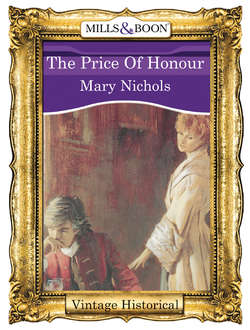Читать книгу The Price Of Honour - Mary Nichols, Mary Nichols - Страница 4
PROLOGUE
Оглавление‘YOU have done what?’
‘We have cashiered him, my lord, for unofficerlike and ungentlemanlike behaviour — after a proper court-martial, of course. In Lisbon.’
The heat in the room was intense and made no cooler by the temper of the commander-in-chief of the British forces, whose names included Hooknose, Nosey, the Peer and the Leopard, a name given to him by Napoleon, to which he had added the epithet ‘hideous’. It did not bother the newly created Viscount Wellington in the slightest; he had adopted it with some amusement and was often heard to refer to his men as ‘my leopards’.
For six months hardly a shot had been fired by either side and the inaction was causing boredom among the troops, not to mention impatience at Westminster. But now the enemy was on the move. Across the Pyrenees they had come, the hordes of Napoleon, eighty thousand strong, marching down through Salamanca towards the Portuguese frontier, mile upon mile of blue and white uniforms, led by Marshal André Masséna and accompanied by heavy cavalry and light horsemen, their coloured plumes moving up and down with the rhythm of their mounts; cuirassiers, whose breastplates glinted in the glaring heat of a Spanish summer; heavy guns on limbers pulled by teams of huge horses, baggage wagons by the thousand, kicking up the dust, advertising their presence to the bands of guerrilleros who watched from their mountain hideouts, ready to pick off stragglers and raid the supply wagons.
They were still a long way from Celerico Da Beira where the British commander-in-chief had his headquarters, and he showed no sign of going out to meet them. While they waited, the officers filled their time with horse racing and shooting matches and the rank and file went fishing and whoring. There were times when the colonel wished the French would hurry their advance and mount an attack, just to give the men something gainful to do, but even if they did it would not happen here. Between them and the enemy front line stood General Craufurd and his Light Division. The colonel envied the dashing general who had found something better to do than keep discipline and worry about supplies.
‘Dammit, he is one of my best scouts.’ Wellington’s voice broke in on his thoughts.
‘Yes, my lord, but you did issue an order that there was to be no looting, and he was caught red-handed. No exceptions, you said, and the officers must set a good example.’ The colonel stood his ground. He had only carried out orders, and how was he to know his lordship would ask for the man specifically? As far as he had been aware, there was nothing out of the ordinary about the fellow.
‘To be sure I did.’ The angry tone of the commander’s voice softened as he realised the justice of what the colonel was saying. ‘Looting, you say?’
‘Yes, my lord.’
‘Of all the ignoble things to be cashiered for,’ his lordship mused. ‘If he had to fall foul of regulations, why could it not be for duelling? At least that has something gentlemanly about it. I could forgive him for that.’
‘Yes, my lord.’
‘Where is he now?’
‘I do not know, my lord. He left.’
‘Has he returned to England, do you think?’
‘I doubt it, my lord; he would not want to face his father, the viscount, and the public disgrace.’
‘Then find him. Find him and bring him to me.’
There was no arguing with Wellington in his present mood; the colonel inclined his head and left the villa which was his regiment’s temporary headquarters. The heat, as he stooped below the lintel and stepped outside, rose to meet him from the baked earth and the strong midday sun almost blinded him. Clapping his cocked hat on his head, he marched across what had once been a field but which now resembled a parade ground as a group of English drill sergeants endeavoured to make soldiers of the untidy riff-raff which made up the Portuguese army. There was a good deal of ribald comment from the red-coated British troops but the untested Portuguese cacadores took it all in good part. They were, after all, going to fight in defence of their homeland and were perhaps the only ones to be glad of the long period of inactivity, in which to train.
Where was Robert Lynmount? the colonel asked himself. Where was the one-time captain of Hussars, hero of the battle of Talavera and now disgraced? And how, in the middle of a war, when he had better things to do, was he going to find him and bring him back? And, what was more, how was he going to reverse the verdict of a properly convened court-martial when there was no doubt about the fellow’s guilt? He swore loudly and sent a trooper in search of Captain Rufus Whitely.
